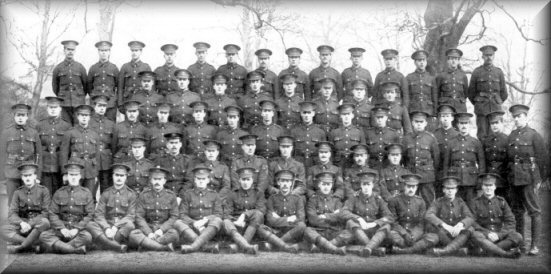![]() PAT PHILLIPS
PAT PHILLIPS
![]()
My grandmother died in 1983 so of course she never heard the word ‘internet’. But she did draw a family tree showing that 5 of her relatives had been killed in action in the First World War and that, also, her Aunt Annie and husband Percy Appleby lost their only child: ‘one son, died of war wounds, 1919’. This always struck me as especially sad. I decided to go on-line and try and find out his story.
I began with the 1901
Census of England and Wales (available on several websites) and found
Annie and Percy Appleby, shipper's clerk, living in Lambeth, South
London with their son, Percy N. Appleby (age 5). Now I had his name
and approximate date of birth (1895-6).
Some men who died of
wounds after the war have war graves, but I didn't really expect to
find Percy on the Commonwealth War Graves Commission digital roll of
honour: www.cwgc.org. Sure
enough, there are war graves for three P. Applebys killed in the
First World War, but in each case either the next of kin details or
the age didn't match.
The next step was to
search the catalogue of World War 1 Medal Index Cards in the National
Archives http://discovery.nationalarchives.gov.uk.
Almost every service-man and woman (alive or dead) was entitled to
medals at the end of the war so these cards are the most complete
list of all who served. There are cards for 13 Percy Applebys but
only one Percy N.
He was Private 9150,
the Manchester Regiment, and he went to France on 8 November 1915.
This date and low service number mean he was one of the ‘Manchester
Pals’ who enlisted in response to Lord Kitchener's famous appeal at
the outbreak of the war. Later in the war he became Private 41412 in
the Labour Corps. (The usual reason for transfers to the Labour Corps
was that a man was no longer A1 fighting fit for front line service.)
He was discharged on 19 February 1919. If this was ‘my’ Percy
from South London, why was he in the Manchesters? I trawled through
the other 12 Medal Index cards, but none seemed any more likely.
Then I noticed from the 1901 census return that Percy Appleby senior
(father) was born in Manchester. That seemed to decide it.

I posted what I had learned on the Great War Forum www.greatwarforum.org and soon received replies. One member told me that Percy was in Platoon II, A Company, 17th (Service) Battalion, Manchester Regiment, and posted a photo of his platoon. Another could tell from the Labour Corps number that he was one of the original members of the Labour Corps which formed on 25 February 1917, and a member of 70 Company. This unit served building and maintaining roads for military use in France 1917-18.
The final step was to
see if I could prove that he died of wounds after the war. On
www.freebmd.org.uk you can
check the indexes to the official registers of Births, Marriages and
Deaths from 1837. Sure enough, a Percy N. Appleby (24) died in the
quarter July-Sept 1919 in Chorlton, near Manchester. Armed with the
reference, I sent off for an official copy of his death certificate
(www.gov.uk/order-copy-birth-death-marriage-certificate).
The death certificate
confirms that Percy Norman Appleby of 143, Bury Old Road, Prestwich,
died aged 24 years on 29th September, 1919 at the Royal Infirmary in
the district of Chorlton. It records that his father Percy Appleby,
same address, was present at his death. Percy junior's occupation is
given as shipping clerk (like his father) and Ex-private 70th Labour
Corps. His cause of death was Lympho-sarcoma Thoracis. This is what
we know today as non-Hodgkin's lymphoma: a tumour of the lymph
glands. Even today the cause is unknown.
So, it seems unlikely
that his death was directly caused by war wounds. What does seem
likely is that he was wounded on the Somme, where the Manchesters
suffered terrible casualties in 1916. This would explain his
transfer to the Labour Corps in 1917. In February 1919 he went back
to live with his parents and was fit enough to go (back?) to work as
a shipping clerk, only to die seven months later. It is hardly
surprising that his parents put his death down to his war wounds.
After all, 4 years earlier he had been an A1 fighting fit 20 year
old.
Percy Norman Appleby
became another forgotten victim of the war, not commemorated on a war
memorial or roll of honour. When his parents died there was almost
no-one to remember him, apart from his cousin, my grandmother. Now,
thanks to information technology that none of them could ever have
imagined, he has been remembered again.
For a direct link to the author of this article, email Pat Phillips
![]()
 Copyright © Pat Phillips, March,
2004, August, 2018.
Copyright © Pat Phillips, March,
2004, August, 2018.
Return to the Hellfire Corner Contents Section